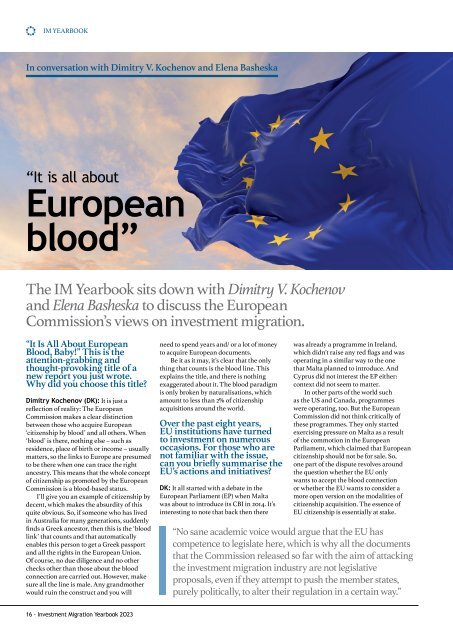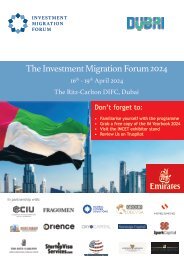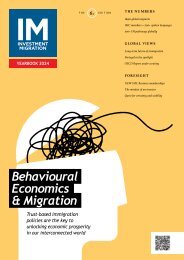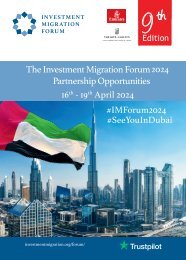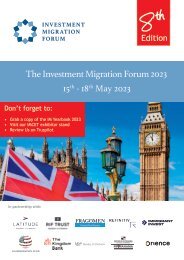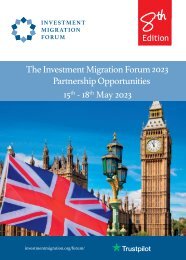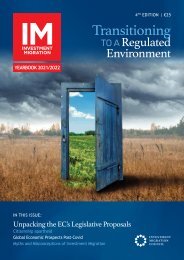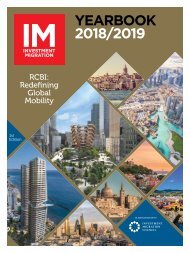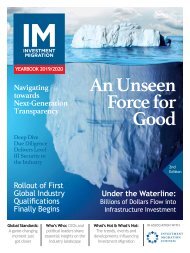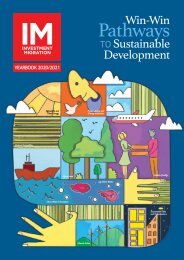IM Yearbook 2023
The completely new IM Yearbook 2023 is the 5th edition of what is now known as the most anticipated guide of the Investment Migration industry. The IM Yearbook is the essential global reference tool for the industry by the industry. Offering unrivaled valuable access to a prime targeted readership of your partners, clients and potential new business сontacts. Decision-makers in more than 54 countries trust the publication as a reputable source of information and guide. Readership includes: agents, law firms, advisory firms, banks, wealth managers, service providers, policy makers, government staffers, international organisations, and academics. Providing comprehensive, in-depth information about the global Investment Migration industry, the IM Yearbook 2023 will offer readers a practical A-Z guide to the current business operating environment while also highlighting the depth and breadth of practitioners, programmes, and their partners of all types.
The completely new IM Yearbook 2023 is the 5th edition of what is now known as the most anticipated guide of the Investment Migration industry.
The IM Yearbook is the essential global reference tool for the industry by the industry. Offering unrivaled valuable access to a prime targeted readership of your partners, clients and potential new business сontacts. Decision-makers in more than 54 countries trust the publication as a reputable source of information and guide. Readership includes: agents, law firms, advisory firms, banks, wealth managers, service providers, policy makers, government staffers, international organisations, and academics.
Providing comprehensive, in-depth information about the global Investment Migration industry, the IM Yearbook 2023 will offer readers a practical A-Z guide to the current business operating environment while also highlighting the depth and breadth of practitioners, programmes, and their partners of all types.
You also want an ePaper? Increase the reach of your titles
YUMPU automatically turns print PDFs into web optimized ePapers that Google loves.
<strong>IM</strong> YEARBOOK<br />
In conversation with Dimitry V. Kochenov and Elena Basheska<br />
“It is all about<br />
European<br />
blood”<br />
The <strong>IM</strong> <strong>Yearbook</strong> sits down with Dimitry V. Kochenov<br />
and Elena Basheska to discuss the European<br />
Commission’s views on investment migration.<br />
“It Is All About European<br />
Blood, Baby!” This is the<br />
attention-grabbing and<br />
thought-provoking title of a<br />
new report you just wrote.<br />
Why did you choose this title?<br />
Dimitry Kochenov (DK): It is just a<br />
reflection of reality: The European<br />
Commission makes a clear distinction<br />
between those who acquire European<br />
‘citizenship by blood’ and all others. When<br />
‘blood’ is there, nothing else – such as<br />
residence, place of birth or income – usually<br />
matters, so the links to Europe are presumed<br />
to be there when one can trace the right<br />
ancestry. This means that the whole concept<br />
of citizenship as promoted by the European<br />
Commission is a blood-based status.<br />
I’ll give you an example of citizenship by<br />
decent, which makes the absurdity of this<br />
quite obvious. So, if someone who has lived<br />
in Australia for many generations, suddenly<br />
finds a Greek ancestor, then this is the ‘blood<br />
link’ that counts and that automatically<br />
enables this person to get a Greek passport<br />
and all the rights in the European Union.<br />
Of course, no due diligence and no other<br />
checks other than those about the blood<br />
connection are carried out. However, make<br />
sure all the line is male. Any grandmother<br />
would ruin the construct and you will<br />
need to spend years and/ or a lot of money<br />
to acquire European documents.<br />
Be it as it may, it’s clear that the only<br />
thing that counts is the blood line. This<br />
explains the title, and there is nothing<br />
exaggerated about it. The blood paradigm<br />
is only broken by naturalisations, which<br />
amount to less than 2% of citizenship<br />
acquisitions around the world.<br />
Over the past eight years,<br />
EU institutions have turned<br />
to investment on numerous<br />
occasions. For those who are<br />
not familiar with the issue,<br />
can you briefly summarise the<br />
EU’s actions and initiatives?<br />
DK: It all started with a debate in the<br />
European Parliament (EP) when Malta<br />
was about to introduce its CBI in 2014. It’s<br />
interesting to note that back then there<br />
was already a programme in Ireland,<br />
which didn’t raise any red flags and was<br />
operating in a similar way to the one<br />
that Malta planned to introduce. And<br />
Cyprus did not interest the EP either:<br />
context did not seem to matter.<br />
In other parts of the world such<br />
as the US and Canada, programmes<br />
were operating, too. But the European<br />
Commission did not think critically of<br />
these programmes. They only started<br />
exercising pressure on Malta as a result<br />
of the commotion in the European<br />
Parliament, which claimed that European<br />
citizenship should not be for sale. So,<br />
one part of the dispute revolves around<br />
the question whether the EU only<br />
wants to accept the blood connection<br />
or whether the EU wants to consider a<br />
more open version on the modalities of<br />
citizenship acquisition. The essence of<br />
EU citizenship is essentially at stake.<br />
“No sane academic voice would argue that the EU has<br />
competence to legislate here, which is why all the documents<br />
that the Commission released so far with the aim of attacking<br />
the investment migration industry are not legislative<br />
proposals, even if they attempt to push the member states,<br />
purely politically, to alter their regulation in a certain way.”<br />
16 - Investment Migration <strong>Yearbook</strong> 2O23


